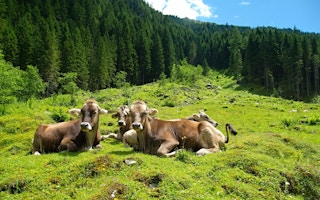Say goodbye to the steaks. Forget the foie gras. Put that pork chop away (assuming you can afford any of them). UK-based scientists say eating less meat is a vital part of tackling climate change.
A study published in Nature Climate Change says that on present trends food production on its own will reach – and perhaps exceed – the global targets for total greenhouse gas emissions in 2050.
Healthier diets – defined as meaning lower meat and dairy consumption – and reduced food waste are among the solutions needed to ensure food security and avoid dangerous climate change, the study says.
More people, with more of us wanting meat-heavy Western diets, mean increasing farm yields will not meet the demands of an expected 9.6 billion humans. So we shall have to cultivate more land.
This, the authors say, will mean more deforestation, more carbon emissions and further biodiversity loss, while extra livestock will raise methane levels.
Inefficient converters
Without radical changes, they expect cropland to expand by 42 per cent by 2050 and fertiliser use by 45 per cent (over 2009 levels). A further tenth of the world’s pristine tropical forests would disappear by mid-century.
“
The average efficiency of livestock converting plant feed to meat is less than 3 per cent, and as we eat more meat, more arable cultivation is turned over to producing feedstock for animals… Agricultural practices are not necessarily at fault here – but our choice of food is
Bojana Bajzelj, lead researcher, University of Cambridge’s department of engineering
All this would cause GHG emissions from food production to increase by almost 80 per cent by 2050 – roughly equal to the target GHG emissions by then for the entire global economy.
They think halving food waste and managing demand for particularly environmentally-damaging food products – mainly from animals - “might mitigate some” GHG emissions.
“It is imperative to find ways to achieve global food security without expanding crop or pastureland,” said the lead researcher, Bojana Bajzelj, from the University of Cambridge’s department of engineering, who wrote the study with colleagues from Cambridge’s departments of geography and plant sciences and the University of Aberdeen’s Institute of Biological and Environmental Sciences.
“The average efficiency of livestock converting plant feed to meat is less than 3 per cent, and as we eat more meat, more arable cultivation is turned over to producing feedstock for animals… Agricultural practices are not necessarily at fault here – but our choice of food is.”
Squandered resources
This measure of efficiency is based on the units used in the study, which are grams of carbon in the biomass material, plant or meat.
The team created a model that compares different scenarios for 2050, including some based on maintaining current trends.
Another examines the closing of “yield gaps”. These gaps, between crop yields from best practice farming and actual average yields, exist everywhere but are widest in developing countries – particularly in sub-Saharan Africa. The researchers advocate closing the gaps through sustainable intensification of farming.
But even then projected food demand will still demand additional land and more water and fertilisers – so the impact on emissions and biodiversity remains.
Food waste occurs at all stages in the food chain, caused in developing countries by poor storage and transport and in the north by wasteful consumption. This squanders resources, especially energy, the authors say.
Yield gap closure alone still shows a GHG increase of just over 40 per cent by 2050. Closing yield gaps and halving food waste shows emissions increasing by 2 per cent. But with healthy diets added too, the model suggests that agricultural GHG levels could fall by 48 per cent from their 2009 level.
The team says replacing diets containing too much food, especially emission-intensive meat and dairy products, with an average balanced diet avoiding excessive consumption of sugars, fats, and meat products, significantly reduces pressures on the environment even further.
It says this “average” balanced diet is “a relatively achievable goal for most. For example, the figures included two 85g portions of red meat and five eggs per week, as well as a portion of poultry a day.”
Co-author Professor Pete Smith from the University of Aberdeen said: “Unless we make some serious changes in food consumption trends, we would have to completely decarbonise the energy and industry sectors to stay within emissions budgets that avoid dangerous climate change.
“That is practically impossible – so, as well as encouraging sustainable agriculture, we need to re-think what we eat.”

















